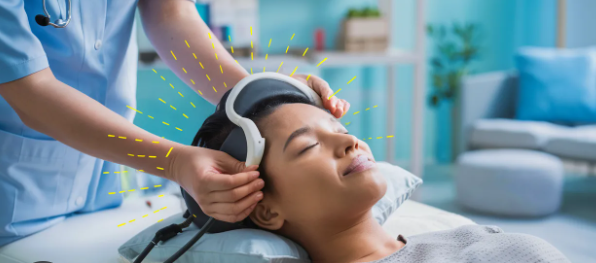
TMS Treatment APN: A Comprehensive Guide to Accelerated Patient Network (APN)
Transcranial Magnetic Stimulation (TMS) has emerged as a groundbreaking treatment in the field of mental health, offering a non-invasive alternative to traditional methods like medication and psychotherapy. Since its development in the late 20th century, TMS has gained widespread recognition for its ability to treat various mental health conditions, particularly depression. This article will delve into the details of TMS treatment APN, its mechanisms, benefits, risks, and the role of the Accelerated Patient Network (APN) in improving patient outcomes.
The Role of Accelerated Patient Network TMS Treatment APN
The Accelerated Patient Network (APN) is a crucial component in expanding access to TMS treatment. APN connects patients with specialized treatment centers, facilitates insurance approvals, and ensures that patients receive timely and coordinated care. By streamlining the process, APN helps to reduce the time between diagnosis and treatment, enabling patients to begin their recovery sooner. Additionally, TMS Treatment APN offers educational resources and support for patients, helping them navigate the complexities of mental health treatment.
What is TMS Treatment?
TMS treatment is a non-invasive procedure that uses magnetic fields to stimulate nerve cells in the brain, primarily targeting areas that are underactive in individuals with mental health disorders. Unlike electroconvulsive therapy (ECT), TMS does not involve inducing seizures, making it a safer and more tolerable option for many patients. The scientific basis of TMS lies in its ability to modulate neuronal activity, which can lead to improvements in symptoms of depression, anxiety, and other conditions.
How TMS Treatment Works
TMS works by delivering magnetic pulses to specific regions of the brain, usually the prefrontal cortex, which is often linked to mood regulation. These pulses generate small electrical currents that can enhance or suppress neuronal activity, depending on the frequency and pattern of the stimulation. The precise targeting of brain regions is critical to the effectiveness of TMS, and advanced techniques like navigated TMS allow for even more accurate stimulation.
See also Wellhealthorganic Vitamin B12: Unlocking the Power of This Essential Nutrient
Types of TMS Treatment
There are several types of TMS treatment, each with its own specific applications:
- Repetitive TMS (rTMS): The most common form of TMS, involving repeated magnetic pulses delivered over several sessions.
- Deep TMS (dTMS): A more advanced form that penetrates deeper into the brain, potentially offering benefits for conditions like OCD and addiction.
- Navigated TMS: Uses imaging technology to guide the placement of the magnetic coil, ensuring precise targeting of brain regions.
Who is a Candidate for TMS Treatment?
TMS is typically recommended for individuals who have not responded to traditional treatments such as antidepressants or psychotherapy. Patients with treatment-resistant depression, anxiety disorders, PTSD, OCD, and certain neurological conditions may be eligible for TMS. However, a thorough assessment by a qualified healthcare provider is necessary to determine if TMS is appropriate, considering factors like medical history, current medications, and the presence of any contraindications.
Benefits of TMS Treatment
TMS offers several advantages over traditional treatments:
- Non-invasive: TMS does not require surgery or anesthesia.
- Few Side Effects: Unlike medications, TMS has minimal systemic side effects.
- Long-term Efficacy: Many patients experience sustained relief from symptoms, even after treatment ends.
- Targeted Therapy: TMS can focus on specific brain regions, making it a personalized treatment option.
Risks and Side Effects of TMS Treatment
While TMS is generally safe, it is not without risks. Common side effects include headaches, scalp discomfort, and brief episodes of dizziness. These effects are usually mild and transient. More serious complications, such as seizures, are rare but possible, particularly in individuals with a history of epilepsy or certain other neurological conditions. It’s crucial to discuss potential risks with a healthcare provider before starting TMS.
TMS Treatment Procedure
A typical TMS session lasts about 20-40 minutes and involves sitting in a chair while a magnetic coil is positioned against the scalp. The coil generates magnetic pulses that pass through the skull and stimulate the brain. Patients usually undergo 5 sessions per week for 4-6 weeks, although this can vary depending on the condition being treated and the patient’s response to therapy.
TMS Treatment and Depression
TMS is particularly effective in treating major depressive disorder (MDD), especially in patients who have not responded to other forms of treatment. Studies have shown that TMS can lead to significant improvements in depressive symptoms, with many patients experiencing remission. Success rates vary, but clinical trials have consistently demonstrated that TMS is a viable option for those struggling with treatment-resistant depression.
TMS Treatment for Anxiety Disorders
Anxiety disorders, including generalized anxiety disorder (GAD) and panic disorder, can also be effectively treated with TMS. The mechanism of action involves modulating the brain’s neural circuits involved in fear and anxiety responses. Compared to medications, TMS offers a side-effect-free alternative that can provide lasting relief.
TMS Treatment for PTSD
Post-traumatic stress disorder (PTSD) is another condition that can benefit from TMS. By targeting brain regions involved in memory and emotional regulation, TMS can help reduce the severity of PTSD symptoms. Research has shown that TMS can lead to significant improvements in flashbacks, anxiety, and hyperarousal, offering hope to those who have not found relief with other treatments.
TMS Treatment for OCD
Obsessive-compulsive disorder (OCD) is notoriously difficult to treat, but TMS offers a promising new approach. By stimulating areas of the brain associated with compulsive behavior, TMS can help reduce the frequency and intensity of OCD symptoms. While TMS is not a cure for OCD, it can provide significant symptom relief and improve the quality of life for patients.
TMS Treatment in Neurological Disorders
Beyond mental health, TMS is also being explored as a treatment for various neurological conditions. For instance, TMS has shown potential in helping patients recover from stroke by promoting neuroplasticity and improving motor function. It is also being studied as a treatment for chronic pain conditions, such as fibromyalgia, and for movement disorders like Parkinson’s disease.
TMS Treatment in Addiction Recovery
Addiction recovery is another area where TMS is making strides. By targeting brain circuits involved in reward and addiction, TMS can help reduce cravings and withdrawal symptoms in individuals struggling with substance use disorders. While research is still ongoing, early results are promising, suggesting that TMS could become a valuable tool in addiction treatment.
Cost of TMS Treatment
The cost of TMS treatment can vary widely depending on the provider, location, and insurance coverage. On average, a full course of treatment can range from $6,000 to $12,000. While this may seem expensive, many insurance plans now cover TMS for certain conditions, and there are financial assistance programs available to help offset the cost. It’s important for patients to discuss these options with their healthcare provider and insurance company.
Finding a TMS Treatment Center
Choosing the right TMS treatment center is crucial for achieving the best outcomes. Patients should look for centers with experienced staff, state-of-the-art equipment, and a strong track record of success. It’s also important to ask about the center’s protocols, the qualifications of the medical staff, and what support services are available before, during, and after treatment.
The Future of TMS Treatment
The future of TMS treatment looks promising, with ongoing research exploring new applications and improvements in technology. Emerging innovations like accelerated TMS protocols, which shorten the treatment duration, and personalized TMS, which tailors the treatment to the individual’s unique brain activity, are just some of the exciting developments on the horizon. As our understanding of brain function continues to grow, so too will the potential of TMS to treat a wider range of conditions.
See also Discover the evolution of Macaco (2007-2016) Salva Reina (2022-Presente)
Frequently Asked Questions about TMS Treatment APN
What conditions can TMS treat?
TMS is primarily used to treat depression, but it is also effective for anxiety, PTSD, OCD, and some neurological conditions.
Is TMS painful?
Most patients describe TMS as mildly uncomfortable, with sensations similar to a tapping on the scalp.
How long do the effects of TMS last?
The effects of TMS can last for several months, and some patients may require maintenance sessions to sustain their improvements.
Can TMS be used alongside medication?
Yes, TMS can be used in conjunction with medication, although some patients may be able to reduce or discontinue their medication after successful TMS treatment.
What should I expect during a TMS session?
During a TMS session, you will sit in a chair while a magnetic coil is placed against your scalp. The session typically lasts 20-40 minutes, and you can resume normal activities immediately afterward.
Is TMS covered by insurance?
Many insurance companies cover TMS for depression, and coverage is expanding to include other conditions. It’s important to check with your insurance provider for specific details.
Conclusion
TMS treatment represents a significant advancement in the field of mental health and neurological care, offering hope to those who have struggled with traditional therapies. With the support of the Accelerated Patient Network (APN), access to TMS is becoming more widespread, helping patients receive timely and effective care. As research continues to evolve, TMS will likely play an even larger role in the treatment landscape, providing relief to countless individuals suffering from mental health and neurological disorders.




